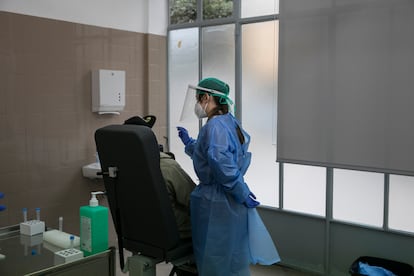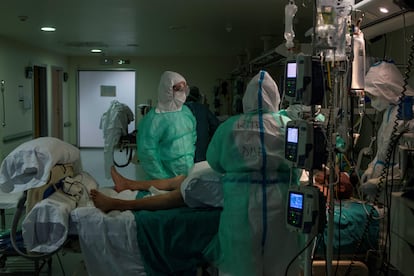Coronavirus variant detected in South Africa is already circulating in Spain
The first case of local contagion of this more-infectious mutation has been found in Barcelona, after random testing was carried out on positive cases. Spain currently counts on very low capacity to carry out such genetic sequencing of the SARS-CoV-2 virus

Spain is facing the arrival of a new, more-contagious strain of the coronavirus: the one that has been identified in South Africa. On Wednesday, Catalonia reported one of these cases after genetic sequencing was carried out on random samples taken from new positives.
“It’s a case that we have just detected and we are starting epidemiological research,” said the head of microbiology at Barcelona’s Vall d’Hebron, Tomàs Pumarola.
This development in the ongoing health crisis comes at a time when Spain has no clear idea of the real impact of the more-contagious coronavirus variant that was discovered in the United Kingdom late last year, and with no real plan underway to increase the country’s capacity to identify new mutations of the SARS-CoV-2 virus.
Spain has established very few controls at the borders. If we haven’t found the South African variant before it’s because we haven’t been looking for itFederico García, microbiology head of service at Granada’s San Cecilio Hospital
The Galicia region identified a patient who had been infected with the South African variant on January 5. But in that case, the person in question was a 30-year-old man who works in the naval sector and had been in the African country. This latest case, however, is not linked to travel and there is no apparent connection to South Africa. As such it marks the first local contagion of the variant in Spain, and an epidemiological study will be required to determine whether the patient in question has been in contact with anyone linked to the country.
“It was entirely foreseeable that cases would start to appear,” said Federico García, the microbiology head of service at Granada’s San Cecilio Hospital. “Spain has established very few controls at the borders in terms of quarantines or PCR [test] requests. If we haven’t found it before it’s because we haven’t been looking for it.”
On Tuesday, the Spanish Cabinet approved the first restrictions on arrivals from South Africa and Brazil, two countries where a more infectious variant is circulating. “Despite everything, my impression is that the prevalence must be low or very low,” García added.
Pumarola sought to normalize the presence of the new variant. “It has already entered our neighboring countries and Catalonia has links to these,” he said. “It’s logical that we would start to find it in our territory.”
The current situation is reminiscent of that seen when the first cases of the variant detected in the UK were first identified in Spain at the end of December. Few such cases were found, but it was understood that more were out there. The reason for this lack of detection is the low capacity that Spain has to genetically sequence the virus, with well under 1% of samples being tested. In the UK, for example, the figure is around 10%. What’s more, this is a slow process, which can take two or more weeks. The result is official data that is light years away from the real situation.

The variant discovered in the United Kingdom could, however, be identified according to the result returned by the PCR test manufactured by a company called Thermo Fisher. But this is not the case with the Brazilian variant, experts have pointed out. “The mutations of a virus are very dynamic processes,” explained Juan Carlos Galán, the head of virology at the Ramón y Cajal Hospital in Madrid. “The way to be able to detect the new variants is to increase the capacity for sequencing and to combine this with screening strategies that are specifically designed to detect them. This is the way to precisely monitor the variants that are causing the greatest concern.”
The Health Ministry and the country’s regions, who are in charge of their own healthcare systems and the restrictions in place to control the pandemic, have agreed on a new strategy to increase the number of samples being sequenced. The aim is to first reach 1% of the total, then moving to 2%, before finally reaching the minimum 5% set out by the European Commission. But this process will be slow. “With the current incidence rates, we would need a month to count on the resources to be able to sample 1%,” explained Federico García, whose hospital, along with the Virgen del Rocío Hospital in Seville, is responsible for carrying out this analysis across the whole of Andalusia – Spain’s most-populous region.
The new variants raise two issues: whether they cause more serious symptoms in patients and whether they reduce the effectiveness of Covid-19 vaccines
One of the current unknowns is whether the South African variant will spread across Spain as fast as the UK strain. The latter has gone from accounting for fewer than 1% of cases at the end of December and the beginning of January to a third of total contagions in regions such as Cantabria or areas of Madrid a month later.
Pumarola explained on Wednesday that the variant detected in South Africa is able to spread in “territories where only the British one dominated, which indicates that it perhaps has a better capacity for adaptation.” This would translate to a greater rate of contagion, something that would seriously threaten Spain’s already overwhelmed healthcare systems.
The European Center for Disease Prevention and Control (ECDC) warned a month ago about the “very high” risk posed to hospitals by these new variants, a point that was included a week ago in a report from the Health Ministry.
The other issues to be addressed are twofold. The first is whether these new variants cause more serious symptoms in patients, something that hospitals such as the Ramón y Cajal and the Virgen del Rocío have started to investigate.
The second is whether the new variants reduce the effectiveness of the Covid-19 vaccines. “The answer is definitely no with the British strain,” explained Amós García, the president of the Spanish Vaccinology Association. “It seems that the South African variant does not affect the response of the vaccines either, and if it does so it is in a reduced manner that does not detract from the usefulness of these drugs.”
While there is less information about the third variant considered to be a risk, the so-called Brazilian strain given that this is where it is circulating most widely, Amós García points out that “the manufacturing companies can adapt the vaccines to the changes that might be detected in the virus.”
English version by Simon Hunter.
Tu suscripción se está usando en otro dispositivo
¿Quieres añadir otro usuario a tu suscripción?
Si continúas leyendo en este dispositivo, no se podrá leer en el otro.
FlechaTu suscripción se está usando en otro dispositivo y solo puedes acceder a EL PAÍS desde un dispositivo a la vez.
Si quieres compartir tu cuenta, cambia tu suscripción a la modalidad Premium, así podrás añadir otro usuario. Cada uno accederá con su propia cuenta de email, lo que os permitirá personalizar vuestra experiencia en EL PAÍS.
¿Tienes una suscripción de empresa? Accede aquí para contratar más cuentas.
En el caso de no saber quién está usando tu cuenta, te recomendamos cambiar tu contraseña aquí.
Si decides continuar compartiendo tu cuenta, este mensaje se mostrará en tu dispositivo y en el de la otra persona que está usando tu cuenta de forma indefinida, afectando a tu experiencia de lectura. Puedes consultar aquí los términos y condiciones de la suscripción digital.








































